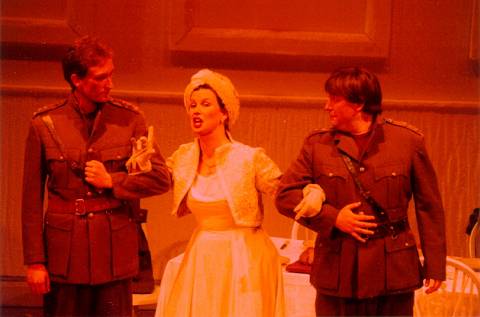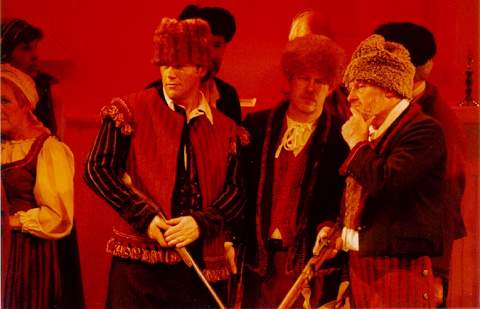|
<< -- 2 -- Roderic Dunnett THE HAUNTED MANOR

The director, Francesca Gilpin, never loses sight of the national theme.
Nothing could be easier than to throw away the opera's centrepiece -- the
famous Act III 'haunting' scene -- as abject farce. That, after all, is what
it appears, and the serious message is certainly cloaked in lashings of
delightful humour. But you have to retain, too, the sense of Maciej's grim,
dowdy room in the Swordbearer's shuttered manor, full of musty Miss Havisham-like
paraphernalia -- severe portraits, an eerie clock, the sense of time and
progress ominously frozen -- being an image of Poland itself at a standstill.
1863 saw one of many clampdowns by the imposed Russian overlords following
the partitions of Poland in the 1790s, left intact by the Versailles treaty.
Chopin and others, like Poland's national poet, Adam Mieckiewicz, took to
travelling western Europe, while -- for all the surface civility of the Warsaw-based
Russian raj -- the Polish aristocracy champed at the bit. Poland had been,
after all, not just vast in terrain (enfolding Lithuania, Saxony and much
of the Ukraine and Belorussia) -- but Europe's only surviving elective kingship.

So the 'haunted manor' is Poland itself : the warrior brothers Stefan
(tenor) and Zbigniew (baritone), its potential Siegfrieds; Miecznik the
Swordbearer, the nation's proud history and conscience; and his daughters
Hanna and Jadwiga, the further embodiment of that conscience. The brothers
must wed Poland, take up arms, and eject the by now ancien regime
of tripartite oppression. Poland sleeps, and must wake. Straszny Dwór
was a call to arms, much as Euripides' plays became a tonic to the militarily-oppressed
Greeks of the l960s. The Russians recognised this when they shut the opera
down after only three performances; surprising they let it get that far.

Continue >>
Copyright © 26 April 2001
Roderic Dunnett, Zagreb, Croatia
 << Music
& Vision home
Mûza Rubackyté >>
<< Music
& Vision home
Mûza Rubackyté >>
|

